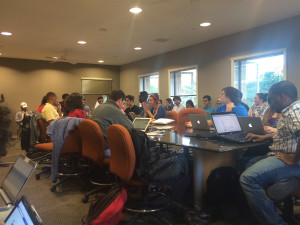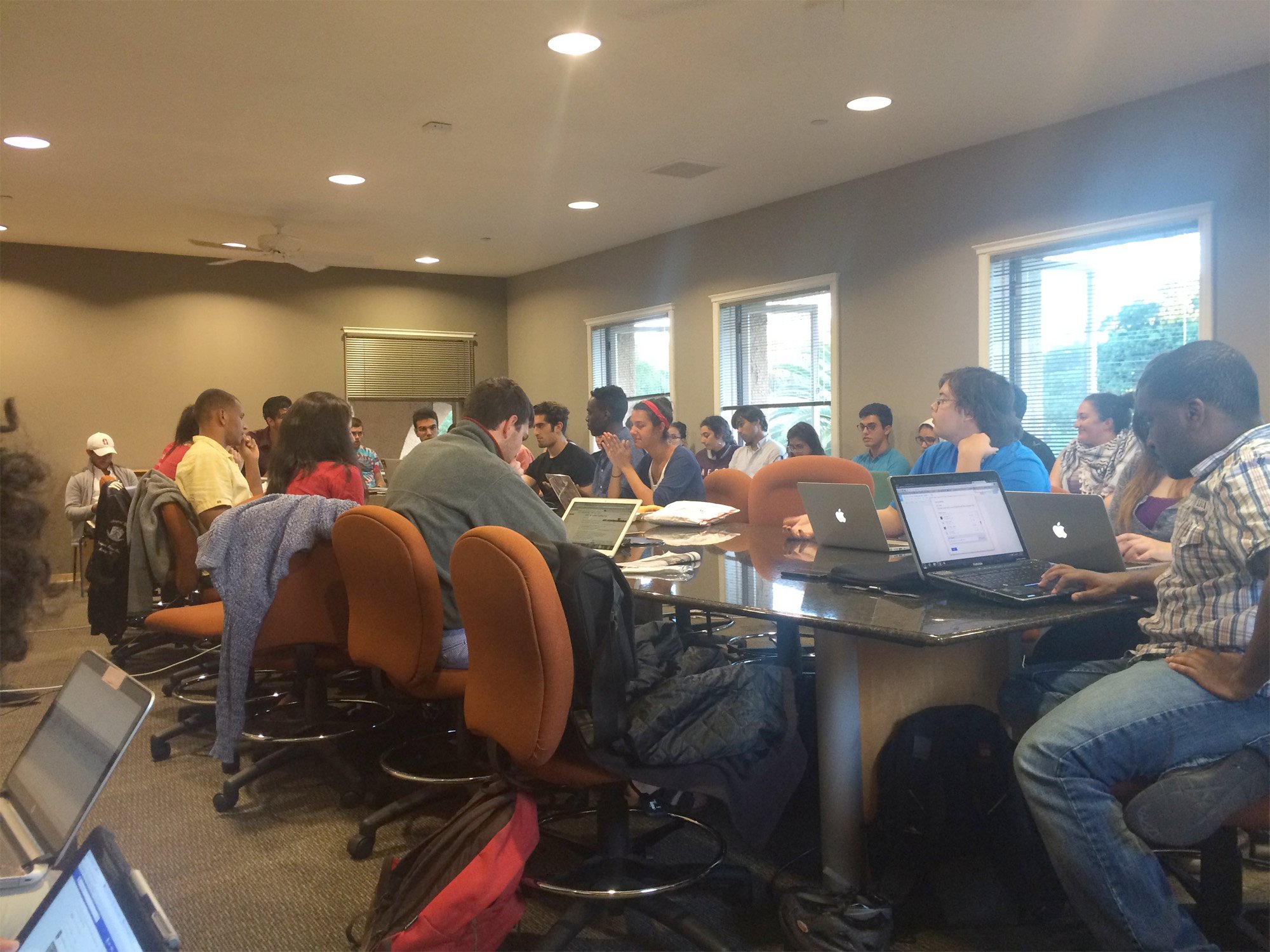The second meeting of the 17th Undergraduate Senate this quarter saw a continuation of last week’s discussion on a resolution against anti-Semitism, which drew a crowd of nearly 30 interested students. The Senate also passed a resolution in support of a proposal to step up sexual violence prevention and heard an Executive update.
Anti-Semitism Bill
Most of the two-hour meeting was spent debating the language of a resolution to support the Jewish community against anti-Semitism. The resolution offered guidelines for defining anti-Semitism on campus and called on the Senate to fund anti-discrimination education and to oppose anti-Semitic activities that come before the Senate.
Following the controversy over the bill at last week’s meeting, Senator Molly Horwitz ’16 revised the bill she had co-authored to exclude the term “anti-Zionism,” which had caused a stir among Senators and student activists.
However, the bill continued to draw flak for clauses that linked anti-Semitism to the denial of Israel’s right to exist. Student activists from the Stanford chapter of Students for Justice in Palestine (SJP) also argued that the bill would curtail pro-Palestinian activism on campus.

“I want to ask about what you mean by ‘self-determination’ for the Jewish people,” said Abdallah Abuhashem ’19, an attendee who is not affiliated with SJP, speaking directly to Horwitz. “If Israel’s self-determination says that they have the right to settlement, you are, in this case, discriminating against Palestinian self-determination.”
Horwitz pointed out that the bill did not diminish Palestinian self-determination, and stated that SJP activism “did not necessarily deny Israel’s right to exist” and that the bill “would not have an effect on pro-Palestinian activism.”
“I think the bill has improved a lot from last week,” Senator TG Sido ’18 added. “We definitely need to pay attention to what Jewish students face on campus, and they face anti-Semitism just as different groups face problems. When Black Lives Matter came out, we knew it stood for certain things that other groups don’t face, which is why All Lives Matter didn’t work. So we need to pay attention to the Jewish students’ needs specifically.”
Senator Gabriel Knight ’17 caused a stir by claiming that the view that “Jews [control] the media, economy, government and other societal institutions” was “not anti-Semitism.”
“[The clause] says: ‘Jews controlling the media, economy, government and other societal institutions’ [is] a feature of anti-Semitism that we theoretically shouldn’t challenge,” Knight said. “I think that that’s kind of irresponsible foraying into another politically contentious conversation. Questioning these potential power dynamics, I think, is not anti-Semitism. I think it’s a very valid discussion.”
Knight later apologized for his statement when Horwitz, along with several Jewish community leaders present, called him out for anti-Semitism.
“I will apologize for when I supposed that [the clause] wasn’t anti-Semitic,” said Knight, “It wasn’t right for me to say that Jewish people can’t be offended by that. What I meant to say is that it’s still making a political statement, which is my problem with the clause — it’s an important conversation we should be having.”
Debate also erupted over the removal of a clause that deemed demonizing, delegitimizing and applying double standards to Israel anti-Semitic.
Kenneth Tea ’17, a student activist who spoke at the Senate discussion, proposed that the clause be removed out of fears that the language would restrict “legitimate criticism of Israeli policy.” The motion was passed by a bare two-thirds majority from Senators, with at least two Senators choosing to abstain.
In response to the removal of the clause, Miriam Pollock ’16 withdrew support from the bill on behalf of Cardinal for Israel.
“The three Ds [demonizing, delegitimizing and applying double standards to Israel] are agreed upon by mainstream Jewish groups as anti-Semitic, including Hillel International,” Pollock explained. “Yes, there are Jews who are anti-Zionist, but that’s not at all a mainstream Jewish position.”
Jewish Students’ Association (JSA) President David Kahn ’17, also voiced his ambivalence towards the bill with the removal of the clause.
“If the bill was intended to curtail free speech, JSA would not support the bill,” Kahn said. “The reality is, however, that in the world today, anti-Semitism often manifests as anti-Zionism. They’re not synonymous, they’re not similar to each other, but it requires scrutiny because the line between them is quite blurry.”
Amid persisting disagreement among Senators, community leaders and activist groups present, the Senate voted to defer the final vote on the resolution to the next meeting.
Recognizing the lingering dissatisfaction with the truncated bill, Hattie Gawande ’18 said, “Out of respect for the organizations that have worked so hard on the bill, [deferring the vote to leave more time for amendments] would be the legitimate thing to do.”
Sexual violence prevention, Executive update
The Senate also passed a resolution in support of a proposal to boost sexual assault prevention on campus, including education for both graduate and undergraduate students.
Graduate Student Council Financial Officer Sam Bydlon Ph.D. ’17 explained that he had strengthened the wording of the bill in support of a more comprehensive definition of sexual violence, as well as mandated that undergraduates repeat the online course on sexual violence in their junior year.
ASSU Vice-President Brandon Hill ’16 delivered the Executive update. He affirmed that Senator Leo Bird ’16 had successfully pushed his resolution on renaming property named after Father Junipero Serra. An as yet unnamed faculty committee has since been formed to explore concrete actions. Meanwhile, President John-Lancaster Finley ’16 and Hill are working on curricular additions for incoming freshmen based on diversity and sexual violence prevention.
Contact Fangzhou Liu at fzliu96 ‘at’ stanford.edu.
